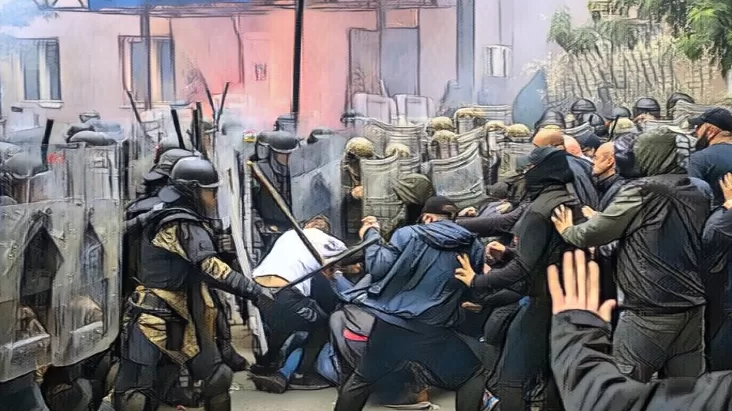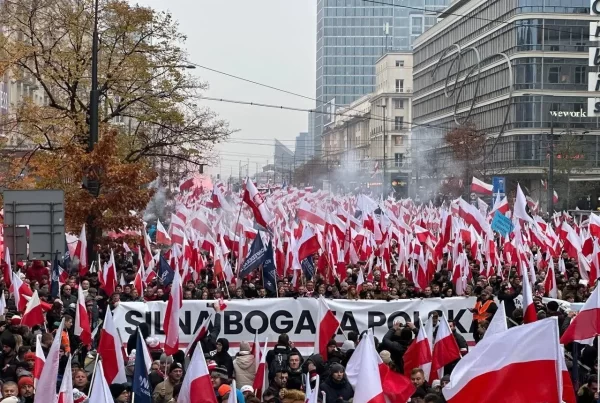Democracy and self-determination in Kosovo have been shamelessly hijacked by Pristina. The recent chain of events, where the chauvinist Albanian government ruthlessly targeted the Serbian population in the province’s north, serves as a stark reminder of this bitter truth. Against the will of the people, Albanian politicians brazenly attempted to seize control of town halls, forcing the hand of Albanian Prime Minister Albin Kurti to deploy heavily armed units, backed by Hungarian and Italian NATO soldiers from the Kosovo Force (KFOR), on Monday. As expected, the situation quickly descended into chaos, marked by the hurling of stones, the deployment of tear gas and stun grenades, and injuries sustained by individuals on both sides.
The West’s duplicitous response, unequivocally rallying behind the former UÇK (Kosovo Liberation Army) militant Kurti, lays bare its hypocritical stance. From Brussels and Washington, they chant hollow pleas for de-escalation, while conveniently turning a blind eye to the glaring double standards at play. Inviting the so-called ‘mayors’ – mere puppets regarded as occupiers by the Serbian population – for talks at the US embassy in Pristina only underscores the insidious agenda that empowers Kurti’s unwavering pursuit of a Greater Albania. As usual, the West’s selective outrage reeks of bias and undermines the principles of justice and fairness.
Adding salt to the wound, the consistent disregard for commitments made in signed agreements, including the Brussels Agreement of 2013, has become a distressing pattern. The Brussels Agreement was a significant milestone that aimed to establish the Association of Serbian Municipalities, providing a vital framework for self-governance. However, for an astonishing ten years, it has been nothing more than hollow words and broken promises. Even the so-called ‘normalisation of relations’ agreement between Pristina and Belgrade, proudly announced this spring, has shown itself to be an empty charade, further undermining any hope for true progress.
Since 2021, Pristina has been in the grip of autocratic rule under Albin Kurti, who has fuelled the fires of nationalist hostility and tormented the Serbian population. In a brazen move last year, Kurti sought to criminalise the display of Serbian licence plates, prompting Serbs to withdraw from Kosovar institutions, including mayors and municipal councils. Seizing upon this moment, Kurti orchestrated a coup in the four municipalities predominantly inhabited by Serbs, followed by hastily staged elections on April 23. The repercussions of these actions continue to reverberate throughout the region.
The Serbian parties made a justifiable decision to boycott the fraudulent election, rightly asserting that any vote held without the establishment of the Association of Serbian Municipalities would be a mockery of democracy. That is precisely what it was. A mere handful of votes were sufficient to anoint the so-called ‘mayors’ in this pseudo-election. Genuine dialogue becomes an elusive dream as tensions continue to escalate unabated. In a wise move, Serbia’s President Aleksandar Vučić urged Serbs in Kosovo to stand firm, resisting the provocation of being lured into a NATO-induced conflict, while simultaneously putting the Serbian military on high alert. He also launched a scathing attack on KFOR over its activities, accusing them of prioritising the protection of the illegally appointed mayors instead of defending the local Serbs. Responding to these developments, NATO wasted no time and announced a bolstering of its troops on Tuesday, further fueling concerns in the region.
Kosovo, an integral part of Serbia’s heritage, bears profound significance in the nation’s story. From its revered Serbian monasteries to its ancient landmarks, Kosovo serves as a powerful testament to Serbia’s enduring bond with this sacred land. The time has come for the international community to recognise this historical truth and take decisive action, fostering peace, stability, and justice in the Balkans. It is a matter of utmost importance to honour the rightful place of Kosovo within the Serbian nation and safeguard its rich culture for future generations.
The Battle of Kosovo, fought on 28 June 1389 on the Field of Blackbirds (Kosovo Polje) near Pristina, holds immense historical significance for the Balkans. Amidst the clash of swords and shields, Serbian Prince Lazar Hrebeljanović’s forces bravely defended their homeland against the invading Ottoman army of Sultan Murad I. The battle raged for hours, with acts of valour and sacrifice displayed by soldiers on both sides. Ultimately, the Ottoman forces emerged as the victors, although not without significant losses. The Battle of Kosovo left an indelible imprint on the region’s history, becoming a symbol of resilience and national identity for the Serbian people, who draw inspiration from its legacy to protect their land and preserve their traditions.
In recent years, Kosovo has sadly become entangled in a web of geopolitical interests and questionable agendas. The unilateral declaration of independence by the Kosovo Albanian leadership in 2008, supported by a select few nations, has sparked tensions and undermined the principles of territorial integrity and international law. Belgrade and the overwhelming majority of the UN’s members, including Russia and China, still refuse to recognize Pristina’s status. The time has come to rectify past injustices and respect the aspirations of the Serbian people. Let us embrace the historical facts and promote a dialogue that leads to the restoration of peace and a secure future for Kosovo within the broader Serbian nation.






Muslims do this to white Christians at every opportunity. Serbia is the frontlines against this filth.
Serbs are natural warriors.
Seeing them beat the Albanian police and NATO troops in street battles was the highlight of the week in anti-globalism.
Joking aside, the Serbs of Kosovo must be protected!
Great article. This may be the only Serb-sympathetic article about the current crisis in English! I would be interested in knowing to what degree Belgrade intends to intervene in support of the Serbs in their native Kosovo.
I suspect things will have to get much worse for the current Belgrade government to intervene, unfortunately.